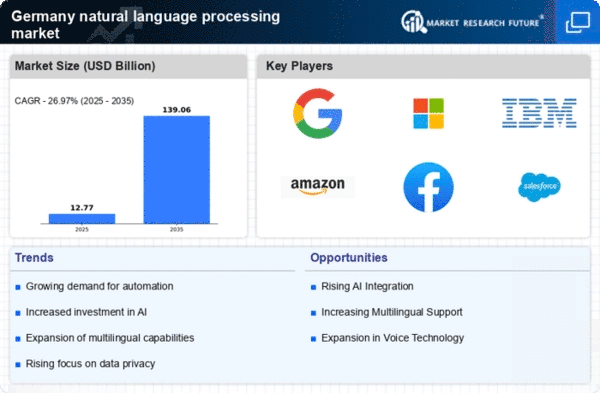Focus on Enhanced Customer Experience
In the competitive landscape of the natural language-processing market, enhancing customer experience has emerged as a critical driver. Companies in Germany are increasingly utilizing NLP to analyze customer interactions and feedback, enabling them to tailor their services more effectively. By employing sentiment analysis and language understanding, businesses can gain insights into customer preferences and pain points. This focus on customer-centric solutions is reflected in the growing investment in NLP technologies, with projections indicating a market growth rate of around 20% annually. As organizations strive to improve customer satisfaction and retention, the natural language-processing market is poised for continued expansion.
Growth of Voice-Activated Technologies
The rise of voice-activated technologies is reshaping the landscape of the natural language-processing market in Germany. With the increasing popularity of smart speakers and voice assistants, consumers are becoming more accustomed to interacting with technology through voice commands. Market Research Future indicates that the voice recognition segment is expected to grow by over 30% in the coming years. This trend is prompting businesses to invest in NLP solutions that can accurately interpret and respond to voice inputs. As a result, the natural language-processing market is likely to see a surge in demand for applications that enhance voice recognition capabilities, making it a pivotal driver of growth.
Integration of NLP in E-commerce Platforms
The integration of natural language-processing technologies into e-commerce platforms is significantly influencing the natural language-processing market in Germany. As online shopping continues to expand, retailers are adopting NLP to enhance user experience through personalized recommendations and improved search functionalities. Recent statistics suggest that e-commerce sales in Germany are expected to reach €100 billion by 2026, with NLP tools facilitating better customer engagement and conversion rates. By utilizing chatbots and virtual assistants powered by NLP, businesses can provide real-time support and streamline the purchasing process. This integration not only boosts sales but also fosters customer loyalty, thereby propelling the natural language-processing market forward.
Advancements in Machine Learning Algorithms
The natural language-processing market in Germany is being propelled by advancements in machine learning algorithms. These innovations are enhancing the capabilities of NLP systems, allowing for more accurate language understanding and generation. Recent developments in deep learning techniques have significantly improved the performance of NLP applications, making them more effective in various domains such as healthcare, finance, and customer service. The market is witnessing a shift towards more sophisticated models that can process vast amounts of data with greater efficiency. As organizations seek to leverage these advancements, the natural language-processing market is expected to experience robust growth, driven by the demand for cutting-edge solutions.
Rising Demand for Automation in Business Processes
The natural language-processing market in Germany is experiencing a notable surge in demand for automation across various business processes. Companies are increasingly recognizing the potential of NLP technologies to streamline operations, enhance customer interactions, and improve overall efficiency. According to recent data, the automation sector is projected to grow by approximately 25% annually, with NLP playing a crucial role in this transformation. Businesses are leveraging NLP to automate customer service inquiries, analyze sentiment in customer feedback, and generate insights from unstructured data. This trend indicates a shift towards more intelligent systems that can understand and respond to human language, thereby driving the growth of the natural language-processing market.
















